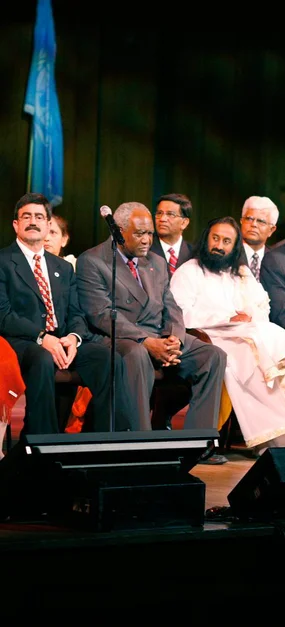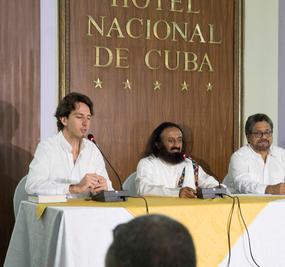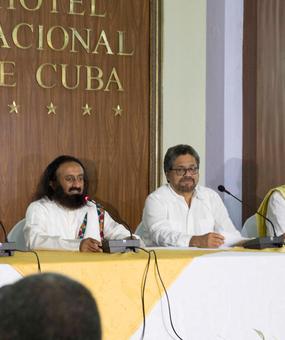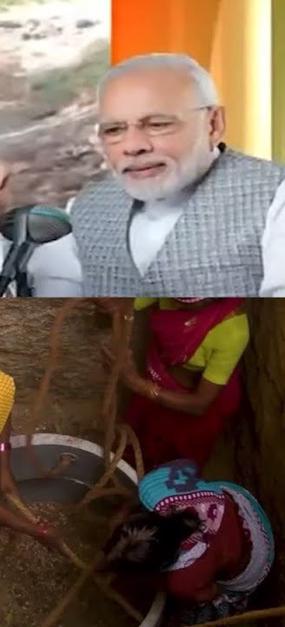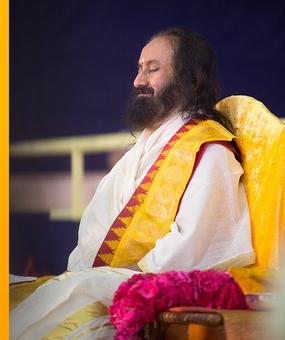“Spirituality should come into politics,” advised Gurudev Sri Sri Ravi Shankar, then Indian Civil Aviation Minister Praful Patel during a nationally televised dialogue, emphasizing the essential connection between spirituality and political welfare. Gurudev has dedicated years to infusing spiritual values into politics. He advocates for the ‘spiritualization’ of politics, socialization of business, and secularization of religion, believing that devoid of spirituality, politics breeds corruption.
Global Outreach and Political Engagements
Gurudev actively engages with leaders across political party lines, extending his efforts globally, engaging with a diverse range of people facilitating dialogue among leaders from different religions and ideological backgrounds spanning continents and cultures.
Recognizing his contributions to shaping a new political order, parliaments worldwide have invited Gurudev to address their lawmakers. He has addressed parliaments of South Africa, France, Germany, Scotland, Brazil, and Argentina besides frequent appearances in the European Parliament.
Gurudev is the only Indian spiritual leader with a following among Pakistan’s political class and was the first Indian spiritual leader to be invited to Iraq.
In 2007, Gurudev introduced a draft of the Universal Declaration of Human Values at the John F. Kennedy Center for Performing Arts in Washington, DC. This event was attended by a multitude of US politicians, including distinguished Senators and Representatives.
Building Consensus in Conflict Zones
Gurudev works in conflict-ridden areas, fostering consensus among political factions.
Visiting War-Torn Iraq
In 2007, Iraqi Prime Minister Nouri al-Maliki invited Gurudev on a peace mission to the troubled country and discuss ways to rebuild war-torn Iraq. Sri Sri shared his deep concern for the violence and hardships endured by the Iraqi people, stating, “The people of Iraq don’t deserve the violence and the pain. My heart bleeds for them.”
Gurudev engaged with representatives from Shia, Sunni, and Kurdish groups. In Baghdad, he had discussions with more than 80 Shia and tribal leaders, urging them to put an end to all forms of violence.
In his appeal, he emphasized embracing the non-violent philosophy of Mahatma Gandhi and letting peace have an opportunity. Sri Sri paid his respects at the tomb of Hazrat Ali during his visit to the Ali Bin Abu Talib Mosque.
Impacted by Gurudev’s humanitarian efforts in Iraq, Shia leader Ayatollah Mohammad Ali Aqaadi expressed, “We welcome your delegation with open arms and hearts. We welcome you as our brother, and we are ready to work hand in hand with you.”
Becoming the first Indian spiritual leader to visit the country, Gurudev also met ministers of youth and human rights. Moved by the impact of the Art of Living Foundation, Iraqi Youth Minister Jasin Mohammed Jaffer pledged to send youth from every province of Iraq to Bangalore for participation in the organization’s Youth Leadership Training Program (Karma Yoga Program).
Sri-Lanka
In Sri Lanka, he collaborated with diverse political parties from the ruling Sri Lanka Freedom Party, the Opposition United National Party and smaller parties such as Tamil National Alliance emphasizing peace.
Consensus in a Polarized Polity
Gurudev stresses the importance of transcending party ideologies for the nation’s welfare.
The masses see Gurudev as the balancing force between the Left and Right of the Indian polity. He offers the middle path on issues where the country is being polarized along political lines
For example, amid India’s divided polity over the civilian nuclear deal, Gurudev appealed for a national consensus, urging parties to prioritize the nation over party interests. Gurudev’s apolitical stance positions him as a mediator between political extremes, fostering unity.
Similarly, in the face of dangers posed by misguided Maoists and extremist Jihadists, Gurudev stands out as a widely embraced advocate for peace. Hindus, Muslims, Christians, Dalits, and Sikhs alike place their trust in him.
Consistently, Gurudev condemns both Left-wing extremism and Right-wing fanaticism unequivocally, advocating for dialogue among individuals of diverse beliefs to foster an environment conducive to national advancement.
Gurudev has demonstrated the ability to unite leaders across the political spectrum. Through numerous public events, he brings together politicians from diverse backgrounds. For instance, during the Silver Jubilee celebrations of The Art of Living in February 2006 in Bangalore, India, 750 politicians from various affiliations participated, highlighting his capacity to foster political harmony.
Correcting Political Short-Sightedness
Gurudev actively educates politicians about the pitfalls of short-sighted policies, cautioning against vote bank politics.
His influence extends beyond conflict resolution to proactive policymaking. He assisted the Maharashtra government in addressing farmer suicides, showcasing his commitment to correcting policies that lead to crises.
During times of significant turmoil, such as the heated debates surrounding caste-based reservations for students, Gurudev staunchly opposed such measures, warning of their potential to sow long-term division and damage societal self-worth.
Additionally, he offers assistance to governments in rectifying policies and resolving contentious issues before they escalate into political quagmires.
An illustrative example of his intervention is seen in Maharashtra, where he spearheaded a comprehensive initiative to effectively curb the alarming rates of farmer suicides when the government faced challenges in addressing the crisis.
Preventing Politically Motivated Conflicts
Whether it involves initiating dialogues with Maoist insurgents or serving as a mediator during communal disputes, Gurudev consistently acts swiftly to prevent politically driven divisions among people.
In 2008, he played a crucial role in resolving the Amarnath land dispute, averting widespread violence in Jammu and Kashmir.
Similarly, in Rajasthan, he mediated the Gujjar community’s demand for recognition, preventing a political deadlock, when the ruling party of the state approached Gurudev to help find a negotiated political settlement.
Pre-empting Political Exploitation of the Marginalized
Gurudev’s efforts extend beyond mere conflict resolution; they delve deeper into preventing conflicts and thwarting the political exploitation of marginalized communities.
In India, the Dalit community continues to face political exploitation, being viewed primarily as a significant vote bank. Political parties often exploit this perception for short-term gains, perpetuating their disconnection from mainstream society.
Throughout the years, Gurudev has remained committed to assisting the Dalit community in breaking free from the chains of social and political exploitation. In 2007, Gurudev organized a groundbreaking conference in New Delhi aimed at eradicating social discrimination based on birth status.
Grassroots Political Education
Gurudev initiates efforts to empower marginalized communities with political awareness, combating their exploitation.
Through The Art of Living’s public programs, people are educated about their political rights, emphasizing the significance of responsible voting.
Addressing a recent campaign to promote electoral participation, Gurudev urged citizens to vote ethically and fulfill their national duty.
A Widely Embraced Influence
As a loved spiritual leader with widespread appeal, Gurudev’s messages resonate with the masses, transcending political affiliations. With a following spanning across societal strata, he holds positive influence over common citizens, policymakers, and influencers alike.
Indeed, likening him to Mahatma Gandhi, Gurudev emerges as a singular figure capable of uniting diverse voices, evident in politicians seeking his counsel across party lines.
Creating Good Politicians and Ending Politics of Mistrust
Gurudev encourages principled individuals to enter politics, aiming to counteract corruption. He urges young politicians to emulate the respect Mahatma Gandhi’s era bestowed upon political figures.
Gurudev envisions a return to values that prioritize national progress over personal gain, bridging the gap between spirituality and governance.
Expressing concern about the politics of hate, Gurudev advocates for unity beyond differences in caste, religion, or ideology. He encourages opposing parties to collaborate on common goals, emphasizing that true politics is caring for all citizens.
De-stressing Politicians
Gurudev says, “To be able to drop prejudices, we need to teach politicians to widen their sense of belongingness. This can happen only when they are free from stress”. Highlighting the correlation between stress reduction and fostering a sense of belongingness to the world at large, Gurudev has extended specially created stress relief programs to politicians worldwide.
Gurudev himself has addressed many lawmakers and taught them relaxation techniques. Addressing the Senate of Argentina in May 2008, he said, “Decision-makers need to be free from stress to come up with great ideas and work well.”
Gurudev Sri Sri Ravi Shankar’s endeavors in spiritualizing politics demonstrate a holistic approach to governance, acknowledging their synergistic contributions to societal welfare. By bridging spirituality and politics, he aims to foster a more ethical and inclusive political landscape. In a world often divided by ideologies, Gurudev’s teachings resonate as a beacon of unity and compassion, guiding political leaders towards a path of collective well-being.




